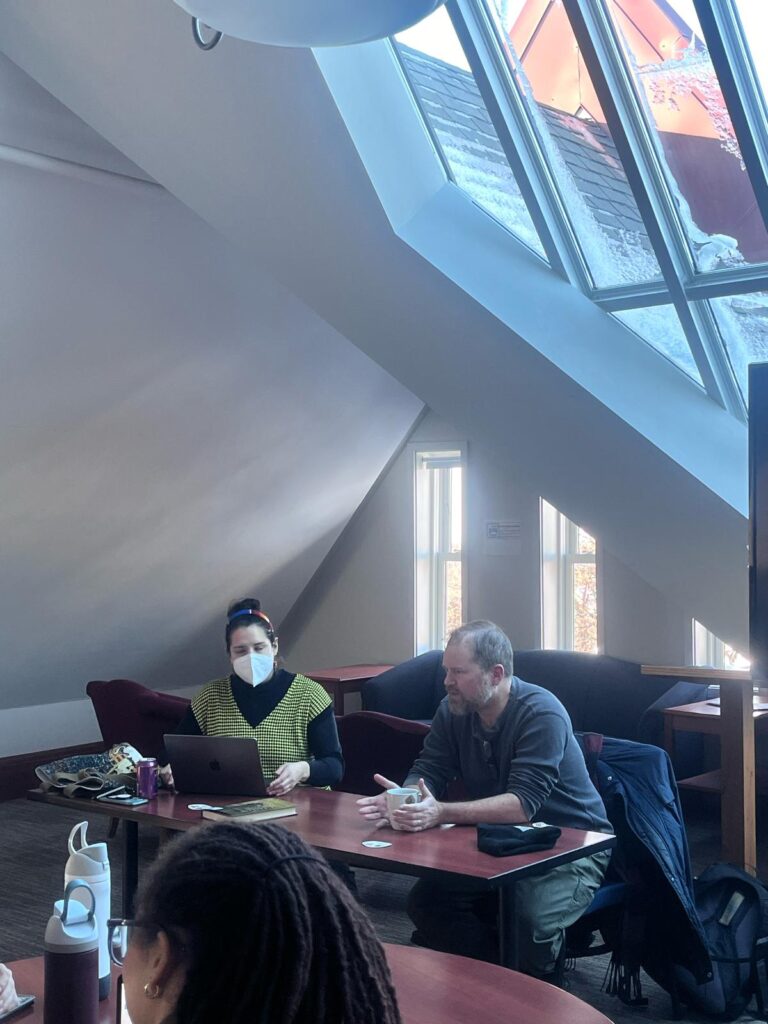Unveiling History and Craft: A Conversation with David Perry on Writing, Identity, and the Publishing World
Contact
The Words: Macalester's English Student NewsletterSenior Newsletter Editors:
Birdie Keller '25
Daniel Graham '26
Callisto Martinez '26
Jizelle Villegas '26
Associate Newsletter Editors:
Ahlaam Abdulwali '25
Beja Puškášová '26
Sarah Tachau '27
Peyton Williamson '27
by Peyton Williamson ’27

On a chilly March afternoon, Professor Coral Lumbley sat down with David M. Perry, a distinguished journalist, author, and medieval historian, to discuss the intersections of history, writing, and the complexities of the publishing world in another of the English department’s fabulous Literary Salons. Perry’s work spans an array of topics, from the history of medieval times to the modern-day struggles of masculinity, disability, and identity. His journey into the world of writing, as well as his perspectives on the craft itself, provided some valuable insights for many of the budding writers and scholars in the audience.
Perry began by sharing a bit about his academic background, noting that he earned his Ph.D. in Medieval History from the University of Minnesota in 2006, and his first job out of graduate school brought him to none other than our beloved Macalester College, where he worked in Old Main itself. His career trajectory later took him to a job in Chicago, where he spent the next decade teaching. Yet despite his academic success, Perry described his entry into public writing as somewhat unexpected. He recalled his very first piece, published in the Star Tribune, and described how writing essays became his way of channeling his frustration with the world: “I get pissed off about things and then write essays.”
Over the years, Perry expanded his writing, delving into topics such as the Pope’s retirement in 2013 for CNN and exploring the connections between history, parenting, and identity. His writing often reflects his personal experiences—particularly as a father raising a son with Down syndrome who later came out as transgender as well. Perry explained that his writing process involves turning his thoughts and emotions into essays, which allow him to process complex feelings. “Writing is about thinking,” he said, underscoring that the act of writing transforms his ideas.
Next, Perry spoke about one of his most significant contributions to the literary world: his book The Bright Ages, which aims to challenge the long-standing notion that the medieval period was simply a time of darkness and ignorance. Perry emphasized the importance of making history accessible to everyone, not just those who willingly enroll in medieval history courses. His books are intended to reach a broader audience, breaking down academic barriers and introducing readers to historical insights that resonate with the present.
Despite his success, Perry was candid about the realities of the publishing world, noting that the industry is often more about sales than the quality of the writing itself. “The success of a book is out of your control,” he said. He noted the phenomenon of the “vanishing midlist author population” in nonfiction publishing, and how difficult it is for books to make an impact unless they sell well. Yet, despite these challenges, he still believes in the importance of writing with purpose. “If you’re interested in the industry, you have to read about it—essays, books, and talking to authors too,” he claims.
Looking to the future, Perry also shared some information about his next big book project, Men: The History of a Bad Idea, which explores the history of patriarchy and its lasting consequences on society. As a historian, he says he turns to the past to find answers to personal crises, such as the challenges of parenting a child with special needs. He describes reading books on the history of Down syndrome as a way of understanding his own experiences. This approach to writing is deeply intertwined with his belief that the act of writing is inherently transformative.
One of the key takeaways Perry emphasized was his belief in the importance of collaboration. He highlighted the value of co-authoring and shared insights into his collaborative process with fellow writer Matthew Gabriele (his Bright Ages co-author). “It’s a question of trust,” Perry explained. “Humanities needs to be more intentional about creating opportunities for co-authorship, especially among graduate students and emerging scholars.” He described how he and Matt rewrite each other’s sentences, often “working over each other’s drafts” in a fluid way. This approach to collaboration, according to him, is what leads to the creation of a truly cohesive and engaging work.
Afterwards, Perry answered some questions from students and also provided valuable advice on how to navigate the challenges of writing in various forms. He stressed the importance of being a “careful observer of life,” taking detailed notes, and using those observations to craft meaningful narratives. “The best version of me,” he said of the editorial process, “is when my drafts are taken and turned into something better.”
As the conversation drew to a close, he offered a final reminder that the act of writing should always be seen as a process of growth—both personal and professional. Hearing about his commitment to the craft and his willingness to help others in their writing journeys was inspiring. Overall, it was a fantastic night!